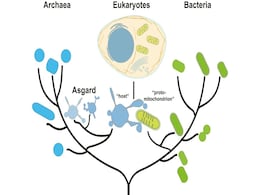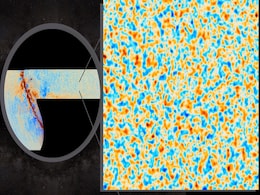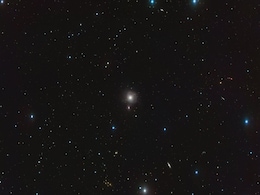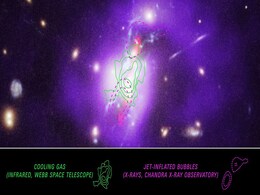Evolution Research
- All
- News
- Videos
-

Two New Exoplanets Found Orbiting a Star in Draco Constellation
- Wednesday April 2, 2025
- Written by Gadgets 360 Staff
Astronomers have identified two exoplanets, TOI-1453 b and TOI-1453 c, orbiting a star 250 light-years away in Draco. The planets, a super-Earth and a sub-Neptune, were detected using NASA’s TESS satellite and the HARPS-N spectrograph. TOI-1453 b is a rocky planet orbiting close to its star, while TOI-1453 c is twice Earth’s size and may have a...
-
 www.gadgets360.com
www.gadgets360.com
-

Asgard Archaea May Hold the Key to the Origins of Eukaryotic Life, New Study Suggests
- Thursday March 27, 2025
- Written by Gadgets 360 Staff
Asgard archaea, a group of single-celled organisms, may hold clues to the evolution of eukaryotic cells. Researchers at ETH Zurich have identified cytoskeletal proteins similar to those in eukaryotes, challenging the traditional three-domain model of life. Their findings suggest these microbes might have enabled key interactions that led to complex...
-
 www.gadgets360.com
www.gadgets360.com
-

Iguanas Travelled 5,000 Miles to Fiji on Rafts 34 Million Years Ago
- Thursday March 20, 2025
- Written by Gadgets 360 Staff
Iguanas undertook a remarkable 5,000-mile journey from North America to Fiji around 34 million years ago. According to a new genetic study, these reptiles floated on rafts of vegetation, possibly due to extreme weather events. The research, published in PNAS, found that Fiji’s iguanas are closely related to North American species, contradicting e...
-
 www.gadgets360.com
www.gadgets360.com
-

Atacama Telescope Reveals Most Detailed Cosmic Microwave Background Yet
- Thursday March 20, 2025
- Written by Gadgets 360 Staff
New images from the decommissioned Atacama Cosmology Telescope offer the most detailed view of the cosmic microwave background. The data reveals early cosmic structures, tracks primordial gas movement, and refines estimates of the universe’s total mass. While supporting existing models, it does not resolve the Hubble tension. Researchers are now ...
-
 www.gadgets360.com
www.gadgets360.com
-

Ancient Europeans Retained Dark Skin, Hair and Eyes Until the Iron Age, Claims New Study
- Monday March 17, 2025
- Written by Gadgets 360 Staff
A genetic study analysing 348 ancient DNA samples reveals that most prehistoric Europeans had dark skin, hair, and eyes well into the Iron Age. Although genes for lighter pigmentation appeared around 14,000 years ago, they remained rare until about 3,000 years ago. Lighter skin may have been advantageous for vitamin D production, while lighter eyes...
-
 www.gadgets360.com
www.gadgets360.com
-

Smallest Galaxy Ever Found: Andromeda XXXV Defies Cosmic Evolution Models
- Thursday March 13, 2025
- Written by Gadgets 360 Staff
Astronomers have discovered Andromeda XXXV, the smallest and faintest known galaxy, located 3 million light-years away. It challenges existing models of galaxy formation, as similar small galaxies were thought to be destroyed in the early universe. Researchers are studying how it retained conditions for star formation despite harsh cosmic environme...
-
 www.gadgets360.com
www.gadgets360.com
-

Black Hole Singularities May Not Exist, Say Scientists
- Friday March 7, 2025
- Written by Gadgets 360 Staff
A new study questions the existence of black hole singularities, suggesting refinements to Einstein’s equations using quantum gravity concepts. Researchers argue that infinite density points may not be real, replacing them with highly curved but finite regions of space-time. While direct observation remains difficult, gravitational waves and earl...
-
 www.gadgets360.com
www.gadgets360.com
-

Neanderthal Genetic Bottleneck 110,000 Years Ago May Explain Their Decline
- Wednesday March 5, 2025
- Written by Gadgets 360 Staff
A study suggests that Neanderthals experienced a population bottleneck 110,000 years ago, drastically reducing their genetic diversity. CT scans of their inner ear bones revealed a sharp decline in variation, indicating a drop in population size. This event may have made Neanderthals more vulnerable to environmental and competitive pressures, contr...
-
 www.gadgets360.com
www.gadgets360.com
-

Unexpected Rotational Motion Detected in Ultra-Diffuse Galaxies of Hydra Cluster
- Wednesday March 5, 2025
- Written by Gadgets 360 Staff
Astronomers studying ultra-diffuse galaxies (UDGs) in the Hydra cluster have observed unexpected rotational movement in nearly half of the 30 galaxies examined. Spectroscopic data from the LEWIS programme, using the MUSE instrument on the Very Large Telescope, suggests that gravitational interactions with larger galaxies may influence their formati...
-
 www.gadgets360.com
www.gadgets360.com
-

Astronomers Spot Galaxy NGC 3640 With a Past of Consuming Smaller Galaxies
- Tuesday February 25, 2025
- Written by Gadgets 360 Staff
Recent observations of NGC 3640 reveal a history of merging with smaller galaxies. Located 88 million light-years away, the elliptical galaxy is suspected to be on a collision course with NGC 3641. The Very Large Telescope captured structural distortions, hinting at previous mergers. Researchers have identified ancient stars acting as fossil marker...
-
 www.gadgets360.com
www.gadgets360.com
-

New Study Challenges Great Filter Theory, Suggests Life Evolves with Planetary Changes
- Monday February 24, 2025
- Written by Gadgets 360 Staff
A recent study argues that intelligent life does not emerge by sheer luck but evolves when planetary conditions become suitable. Researchers challenge the "great filter" concept, suggesting that Earth's changing geobiology influenced when life arose rather than a series of improbable events. This perspective shifts the focus to how planetary enviro...
-
 www.gadgets360.com
www.gadgets360.com
-

Scientists Observe Rare Plastic Ice, A Hybrid Form of Ice and Water, Under Extreme Pressure and Heat
- Thursday February 20, 2025
- Written by Gadgets 360 Staff
Researchers have observed plastic ice, a phase where water molecules rotate while staying in a solid structure. The discovery, made under extreme pressure and heat, could provide new insights into the composition of icy exoplanets and moons. The findings suggest plastic ice VII may have existed in Europa and Titan's interiors and could influence nu...
-
 www.gadgets360.com
www.gadgets360.com
-

New Study Suggests Intelligent Life May Be More Common Than Thought
- Tuesday February 18, 2025
- Written by Gadgets 360 Staff
A groundbreaking study challenges the long-held belief that intelligent life is rare, proposing that the emergence of complex life could be a natural outcome of planetary conditions. Researchers suggest that life evolves in response to planetary changes, rather than a series of improbable evolutionary leaps. This new model, led by experts in astrop...
-
 www.gadgets360.com
www.gadgets360.com
-

Human-Like Lifeforms Beyond Earth? New Study Says It's More Likely Than We Thought
- Sunday February 16, 2025
- Science | Edited by Ritu Singh
The research proposes that the emergence of humanity on Earth was not as improbable as previously thought, potentially increasing the likelihood of intelligent life existing on other planets.
-
 www.ndtv.com
www.ndtv.com
-

Webb Telescope Unveils Hidden Process Behind Star Formation in Phoenix Cluster
- Friday February 14, 2025
- Written by Gadgets 360 Staff
NASA’s James Webb Space Telescope has uncovered the missing link in star formation within the Phoenix galaxy cluster. By mapping intermediate-temperature gas, researchers identified a crucial phase of cooling that was previously undetected. This discovery explains why the cluster’s supermassive black hole does not fully prevent star formation, ...
-
 www.gadgets360.com
www.gadgets360.com
-

Two New Exoplanets Found Orbiting a Star in Draco Constellation
- Wednesday April 2, 2025
- Written by Gadgets 360 Staff
Astronomers have identified two exoplanets, TOI-1453 b and TOI-1453 c, orbiting a star 250 light-years away in Draco. The planets, a super-Earth and a sub-Neptune, were detected using NASA’s TESS satellite and the HARPS-N spectrograph. TOI-1453 b is a rocky planet orbiting close to its star, while TOI-1453 c is twice Earth’s size and may have a...
-
 www.gadgets360.com
www.gadgets360.com
-

Asgard Archaea May Hold the Key to the Origins of Eukaryotic Life, New Study Suggests
- Thursday March 27, 2025
- Written by Gadgets 360 Staff
Asgard archaea, a group of single-celled organisms, may hold clues to the evolution of eukaryotic cells. Researchers at ETH Zurich have identified cytoskeletal proteins similar to those in eukaryotes, challenging the traditional three-domain model of life. Their findings suggest these microbes might have enabled key interactions that led to complex...
-
 www.gadgets360.com
www.gadgets360.com
-

Iguanas Travelled 5,000 Miles to Fiji on Rafts 34 Million Years Ago
- Thursday March 20, 2025
- Written by Gadgets 360 Staff
Iguanas undertook a remarkable 5,000-mile journey from North America to Fiji around 34 million years ago. According to a new genetic study, these reptiles floated on rafts of vegetation, possibly due to extreme weather events. The research, published in PNAS, found that Fiji’s iguanas are closely related to North American species, contradicting e...
-
 www.gadgets360.com
www.gadgets360.com
-

Atacama Telescope Reveals Most Detailed Cosmic Microwave Background Yet
- Thursday March 20, 2025
- Written by Gadgets 360 Staff
New images from the decommissioned Atacama Cosmology Telescope offer the most detailed view of the cosmic microwave background. The data reveals early cosmic structures, tracks primordial gas movement, and refines estimates of the universe’s total mass. While supporting existing models, it does not resolve the Hubble tension. Researchers are now ...
-
 www.gadgets360.com
www.gadgets360.com
-

Ancient Europeans Retained Dark Skin, Hair and Eyes Until the Iron Age, Claims New Study
- Monday March 17, 2025
- Written by Gadgets 360 Staff
A genetic study analysing 348 ancient DNA samples reveals that most prehistoric Europeans had dark skin, hair, and eyes well into the Iron Age. Although genes for lighter pigmentation appeared around 14,000 years ago, they remained rare until about 3,000 years ago. Lighter skin may have been advantageous for vitamin D production, while lighter eyes...
-
 www.gadgets360.com
www.gadgets360.com
-

Smallest Galaxy Ever Found: Andromeda XXXV Defies Cosmic Evolution Models
- Thursday March 13, 2025
- Written by Gadgets 360 Staff
Astronomers have discovered Andromeda XXXV, the smallest and faintest known galaxy, located 3 million light-years away. It challenges existing models of galaxy formation, as similar small galaxies were thought to be destroyed in the early universe. Researchers are studying how it retained conditions for star formation despite harsh cosmic environme...
-
 www.gadgets360.com
www.gadgets360.com
-

Black Hole Singularities May Not Exist, Say Scientists
- Friday March 7, 2025
- Written by Gadgets 360 Staff
A new study questions the existence of black hole singularities, suggesting refinements to Einstein’s equations using quantum gravity concepts. Researchers argue that infinite density points may not be real, replacing them with highly curved but finite regions of space-time. While direct observation remains difficult, gravitational waves and earl...
-
 www.gadgets360.com
www.gadgets360.com
-

Neanderthal Genetic Bottleneck 110,000 Years Ago May Explain Their Decline
- Wednesday March 5, 2025
- Written by Gadgets 360 Staff
A study suggests that Neanderthals experienced a population bottleneck 110,000 years ago, drastically reducing their genetic diversity. CT scans of their inner ear bones revealed a sharp decline in variation, indicating a drop in population size. This event may have made Neanderthals more vulnerable to environmental and competitive pressures, contr...
-
 www.gadgets360.com
www.gadgets360.com
-

Unexpected Rotational Motion Detected in Ultra-Diffuse Galaxies of Hydra Cluster
- Wednesday March 5, 2025
- Written by Gadgets 360 Staff
Astronomers studying ultra-diffuse galaxies (UDGs) in the Hydra cluster have observed unexpected rotational movement in nearly half of the 30 galaxies examined. Spectroscopic data from the LEWIS programme, using the MUSE instrument on the Very Large Telescope, suggests that gravitational interactions with larger galaxies may influence their formati...
-
 www.gadgets360.com
www.gadgets360.com
-

Astronomers Spot Galaxy NGC 3640 With a Past of Consuming Smaller Galaxies
- Tuesday February 25, 2025
- Written by Gadgets 360 Staff
Recent observations of NGC 3640 reveal a history of merging with smaller galaxies. Located 88 million light-years away, the elliptical galaxy is suspected to be on a collision course with NGC 3641. The Very Large Telescope captured structural distortions, hinting at previous mergers. Researchers have identified ancient stars acting as fossil marker...
-
 www.gadgets360.com
www.gadgets360.com
-

New Study Challenges Great Filter Theory, Suggests Life Evolves with Planetary Changes
- Monday February 24, 2025
- Written by Gadgets 360 Staff
A recent study argues that intelligent life does not emerge by sheer luck but evolves when planetary conditions become suitable. Researchers challenge the "great filter" concept, suggesting that Earth's changing geobiology influenced when life arose rather than a series of improbable events. This perspective shifts the focus to how planetary enviro...
-
 www.gadgets360.com
www.gadgets360.com
-

Scientists Observe Rare Plastic Ice, A Hybrid Form of Ice and Water, Under Extreme Pressure and Heat
- Thursday February 20, 2025
- Written by Gadgets 360 Staff
Researchers have observed plastic ice, a phase where water molecules rotate while staying in a solid structure. The discovery, made under extreme pressure and heat, could provide new insights into the composition of icy exoplanets and moons. The findings suggest plastic ice VII may have existed in Europa and Titan's interiors and could influence nu...
-
 www.gadgets360.com
www.gadgets360.com
-

New Study Suggests Intelligent Life May Be More Common Than Thought
- Tuesday February 18, 2025
- Written by Gadgets 360 Staff
A groundbreaking study challenges the long-held belief that intelligent life is rare, proposing that the emergence of complex life could be a natural outcome of planetary conditions. Researchers suggest that life evolves in response to planetary changes, rather than a series of improbable evolutionary leaps. This new model, led by experts in astrop...
-
 www.gadgets360.com
www.gadgets360.com
-

Human-Like Lifeforms Beyond Earth? New Study Says It's More Likely Than We Thought
- Sunday February 16, 2025
- Science | Edited by Ritu Singh
The research proposes that the emergence of humanity on Earth was not as improbable as previously thought, potentially increasing the likelihood of intelligent life existing on other planets.
-
 www.ndtv.com
www.ndtv.com
-

Webb Telescope Unveils Hidden Process Behind Star Formation in Phoenix Cluster
- Friday February 14, 2025
- Written by Gadgets 360 Staff
NASA’s James Webb Space Telescope has uncovered the missing link in star formation within the Phoenix galaxy cluster. By mapping intermediate-temperature gas, researchers identified a crucial phase of cooling that was previously undetected. This discovery explains why the cluster’s supermassive black hole does not fully prevent star formation, ...
-
 www.gadgets360.com
www.gadgets360.com






















